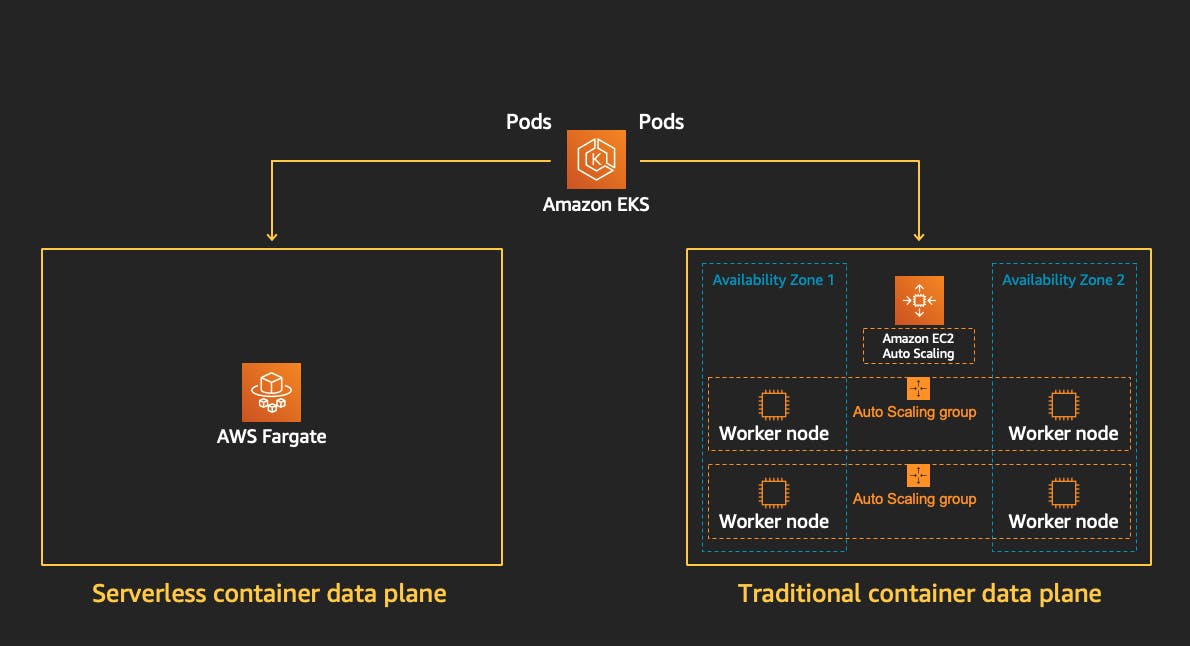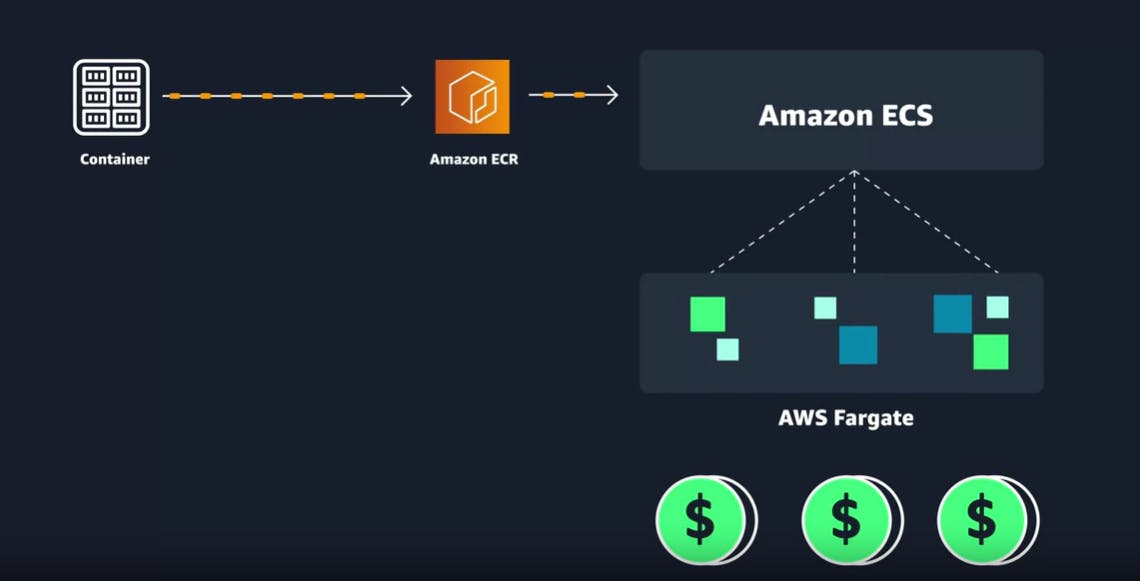AWS Fargate is a serverless compute engine for containers that allows you to run Docker containers without having to manage the underlying infrastructure. It is a fully managed service that allows you to focus on your applications and not worry about the underlying infrastructure. In this blog, we will explore AWS Fargate in detail.
What is AWS Fargate?
AWS Fargate is a serverless compute engine for containers that allows you to run Docker containers without having to manage the underlying infrastructure. Fargate makes it easy to deploy and manage containers in the cloud without the need to provision or manage servers. With Fargate, you pay only for the resources you use, making it a cost-effective solution for running containerized applications.

How does AWS Fargate work?
AWS Fargate provides a way to run containers without having to manage the underlying infrastructure. It allows you to define your application as a set of containers, and then Fargate takes care of provisioning the necessary compute resources to run those containers. Fargate automatically scales the compute resources based on the demand, so you only pay for what you use.
To use Fargate, you need to create a task definition that describes your application and its requirements. The task definition specifies the Docker images to use, the container ports to open, and any environment variables to set. You can also specify the amount of CPU and memory that each container requires.
Once you have created the task definition, you can then create a Fargate cluster. The cluster is a logical grouping of Fargate resources, and it provides a way to manage and scale your containerized applications. You can specify the number of tasks you want to run, and Fargate will automatically distribute them across the available compute resources.
Benefits of AWS Fargate
Serverless: With AWS Fargate, you don't have to manage the underlying infrastructure. You only pay for the resources you use, making it a cost-effective solution.
Scalability: Fargate automatically scales the compute resources based on demand, ensuring that your applications can handle traffic spikes without any downtime.
Security: AWS Fargate provides a secure environment for running containers. It isolates each container and ensures that they cannot access other containers or the underlying host.
Easy to use: AWS Fargate makes it easy to deploy and manage containers in the cloud. You don't have to worry about the underlying infrastructure, and you can focus on your applications.
Compatibility: AWS Fargate is compatible with Amazon Elastic Container Service (ECS) and Amazon Elastic Kubernetes Service (EKS), making it easy to migrate your existing containerized applications to Fargate.

AWS Fargate is a powerful serverless compute engine for containers that makes it easy to deploy and manage containerized applications in the cloud. With Fargate, you don't have to worry about the underlying infrastructure, and you only pay for the resources you use. Fargate automatically scales the compute resources based on demand, ensuring that your applications can handle traffic spikes without any downtime. If you're looking for a cost-effective and easy-to-use solution for running containerized applications in the cloud, AWS Fargate is definitely worth considering.
Let's dive deeper into some of the key features and benefits of AWS Fargate.
- Cost-Effective
With AWS Fargate, you only pay for the resources you use. This means that you don't have to worry about over-provisioning resources or paying for idle compute capacity. Fargate automatically manages the resources required to run your containers, so you can focus on building and deploying your applications. This makes AWS Fargate a cost-effective solution for running containerized applications in the cloud.
- Elastic Scaling
AWS Fargate automatically scales the compute resources based on demand. This means that you can handle traffic spikes without having to manually scale up your infrastructure. Fargate also scales down the resources when the demand decreases, so you don't have to pay for unused resources. This elasticity allows you to handle variable workloads without any downtime.
- Easy to Use
AWS Fargate is easy to use and doesn't require any special skills or knowledge. You can easily create and manage your containerized applications using the AWS Management Console or AWS CLI. Fargate abstracts away the underlying infrastructure, so you don't have to worry about the details of managing servers, load balancers, or other infrastructure components.
- Secure
AWS Fargate provides a secure environment for running containers. Each container is isolated from other containers and the underlying host. Fargate also provides built-in security features such as encryption, access control, and network security groups to protect your applications from external threats.
- High Availability
AWS Fargate provides high availability by automatically deploying containers across multiple Availability Zones. This ensures that your applications are available even if an entire Availability Zone goes down. Fargate also provides built-in load balancing and auto-scaling features to ensure that your applications can handle traffic spikes and remain highly available.
- Compatible
AWS Fargate is compatible with Amazon Elastic Container Service (ECS) and Amazon Elastic Kubernetes Service (EKS). This makes it easy to migrate your existing containerized applications to Fargate. You can also use AWS Fargate with other AWS services such as Amazon S3, Amazon RDS, and Amazon DynamoDB.

Let's take a closer look at how AWS Fargate works with Amazon Elastic Container Service (ECS) and Amazon Elastic Kubernetes Service (EKS).
AWS Fargate with Amazon ECS
Amazon Elastic Container Service (ECS) is a fully-managed container orchestration service that allows you to easily run, scale, and manage Docker containers. With ECS, you can use Fargate as a launch type for your tasks. A task is a group of one or more containers that run together on the same host. You can define a task definition that specifies the containers to run, the resources to allocate, and any dependencies between containers.
When you launch a task with Fargate, ECS automatically provisions the necessary compute resources and launches the containers on your behalf. Fargate also automatically scales the resources up or down based on the demand, ensuring that your applications can handle traffic spikes without any downtime. With Fargate, you don't have to worry about the underlying infrastructure, and you can focus on your applications.
AWS Fargate with Amazon EKS
Amazon Elastic Kubernetes Service (EKS) is a fully-managed Kubernetes service that makes it easy to deploy, manage, and scale containerized applications using Kubernetes. With EKS, you can use Fargate as a node type for your Kubernetes cluster. A node is a worker machine that runs containerized applications. When you create a Fargate profile, you specify the Kubernetes namespace, selector, and other parameters that determine which pods can be launched on Fargate.
When you deploy a pod to your EKS cluster, the Kubernetes scheduler determines which node to place the pod on. If the pod matches the selector in the Fargate profile, the scheduler launches the pod on a Fargate instance. Fargate automatically provisions the necessary compute resources and runs the containers on your behalf. Fargate also automatically scales the resources up or down based on the demand, ensuring that your applications can handle traffic spikes without any downtime.
In conclusion, AWS Fargate is a flexible and powerful compute engine for running containerized applications in the cloud. Whether you're using Amazon ECS or Amazon EKS, Fargate provides a serverless way to run containers without having to manage the underlying infrastructure. With Fargate, you can focus on your applications and let AWS handle the infrastructure for you.

In conclusion, AWS Fargate is a powerful and flexible compute engine for running containers in the cloud. With Fargate, you can easily deploy and manage containerized applications without having to manage the underlying infrastructure. Fargate provides cost-effective, elastic, secure, and highly available infrastructure for your applications. If you're looking for a serverless solution for running containerized applications, AWS Fargate is definitely worth considering.
